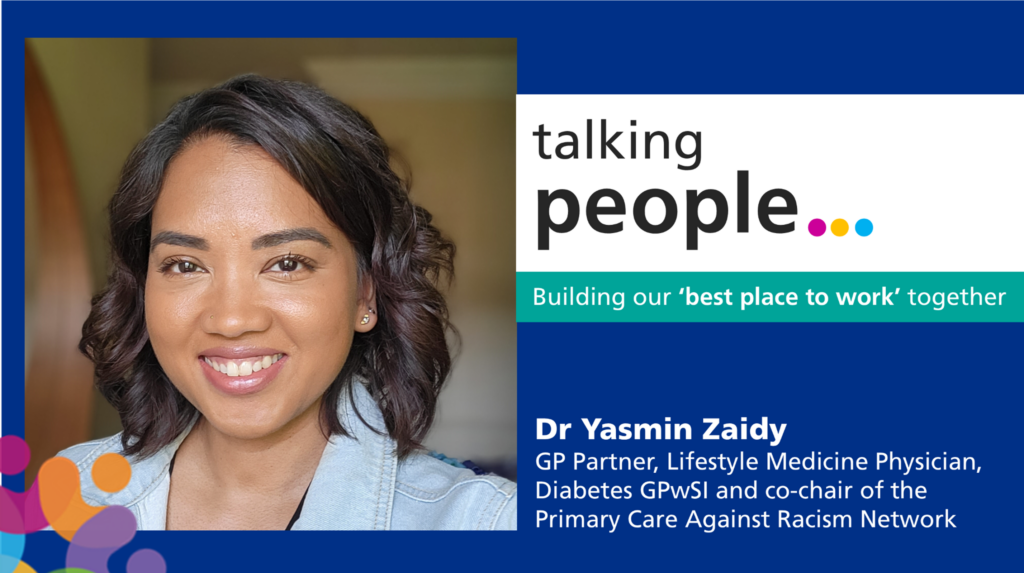We’re currently in the holy month of Ramadan – the ninth month of the Islamic (lunar) calendar and one of the holiest months of the year for Muslims.
Muslims believe that it was in this month that Archangel Gabriel revealed the first verses of the Holy Quran to Prophet Muhammad (SA). During Ramadan Muslims around the world do not eat or drink and abstain from physical intimacy from dawn to sunset. They are also expected to do acts of charity, service and reflection.
As a non-Muslim, there are steps you can take to support your Muslim colleagues during this time:
- This can be a challenging time for Muslim colleagues who are working long hours in health and care and may be feeling the physical effects of fasting. We might be a bit quieter and aloof.
Please show understanding by not holding us to the same level of expectations when considering participation at meetings or volunteering us to lead a CQC inspection. - Ramadan is personal and is different for everyone so it is important to not make assumptions. Not everyone fasts and this doesn’t make us any more or less Muslim.
It’s important to avoid making assumptions about a colleague’s religious or cultural background based on their appearance or name too. Not all Arabs are Muslims and not all Muslims observe fasting during Ramadan. They may just be agnostic with Muslim heritage.
Muslims are exempted from fasting for any number of reasons, for example they could be pregnant, menstruating or have a health condition.
If we’re not fasting, we might be encouraged to do other acts of charity and service, and this doesn’t make us any more or less Muslim. - Offer flexibility and support where possible to, try to accommodate your Muslim colleagues’ needs during Ramadan. This might include allowing us to take breaks to pray or rest, adjusting our schedules to avoid long day shifts, or providing access to a quiet space to offer prayers.
If making an exception makes you feel uncomfortable, then you may have an unconscious bias. Remember, addressing unconscious bias is an ongoing process that requires commitment and effort. - Don’t be afraid to ask us if you’re unsure – questions are great but passing comments can come across as microaggressions.
Most people are happy to answer questions where these are approached with an open mind, a willingness to learn and from a place of respect. We’d love to share with others why this is such an important month for Muslims.
But comments such as: “oh not even water?”, “aren’t you Muslim? So why aren’t you fasting?” can be unintentionally offensive and can come across as microaggressions. Remember, everyone is different – it is fine to ask, it is not ok to judge. - It’s always a good idea to communicate with your Muslim colleagues if you are organising a work meal during Ramadan. We’d really appreciate it if you could plan it to start after sunset so we can join in.
Honestly, we don’t like turning down invitations; like anyone, we want to belong and feel a sense of connection with our teams. Eating together after sunset is a great way to mark Ramadan and break our fasts (called an iftar). - Join us to celebrate! The end of Ramadan is marked by the festival of Eid al-Fitr, a celebration of community, family and faith.
Muslim colleagues are not being difficult on purpose when we ask for a different date to celebrate Eid every year. We are simply following the lunar calendar which is shorter than the Georgian calendar and therefore it falls 11 days earlier each year.
Predicting the exact date when Ramadan ends and Eid begins can be very tricky. It can be different even within local towns, from one mosque to another or one home to another.
Our dates depend on the sect of Islam we belong to and also on the sighting of the new moon – some of us wait for a local sighting, some go by the nearest Muslim country and others follow the Kingdom of Saudi Arabia.
You might find that Muslim colleagues in your team are starting or finishing Ramadan on a different day and this goes for Eid too. - Wish them! It’s OK to wish your Muslim colleagues a Happy Ramadan, Ramadan Kareem or Ramadan Mubarak and on Eid day, you can say Happy Eid, Eid Mubarak or Eid Saeed.
You can find out more about the holy month in the NHS Muslim Network’s Ramadan and Eid Guidance. It includes details about the NHS Ramadan Challenge where you can join your Muslim colleagues for a day of fasting.
This can help you to understand and experience how we feel when we’re fasting for Ramadan. It’s also a great way to show allyship, gratitude and to experience what the less fortunate go through.
Ramadan Mubarak from my home to yours, to everyone observing Ramadan and those supporting us on our spiritual journeys during the holy month.

